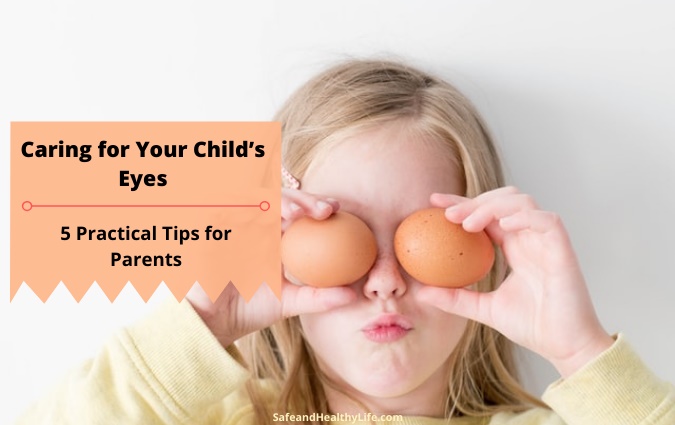[ad_1]

Children often have no clue what is happening when something is wrong with their bodies. Usually, unless they feel pain or any afflictions of illness, they often disregard safety measures that could prevent health problems from arising. This much can be said for children and their eyes.
The eyes are incredibly delicate. Treating any kind of damage to them may not be as easy – or as affordable – as you might think.
However, caring for children’s eyes isn’t impossible. You can do several things to help your little one maintain their eyesight from birth through their teenage years. Here are five examples of practical tips pediatric eye care experts swear by:
1. Maintain a healthy, eyesight-friendly diet
Eating right is probably the most crucial practice your child should maintain to protect their eyesight. In fact, you should eat balanced meals during and after pregnancy. This way, you would be able to set an example for your little one to follow.
Attention to good quality childhood nutritional sources provides the basis for normal eye and brain development and maturity and reduces the risk of early degeneration and deterioration in neural function and learning progress.
Below are some of the most eye-friendly foods you should serve your child:
Leafy greens
Fruits and vegetables should always be present in your kid’s meals.
Some of the best vegetables for eye health are kale, spinach, and collard greens. These leafy greens are rich in beta-carotene that helps reduce the progression of macular degeneration. They contain lots of lutein that aids in preventing cataracts, too. Soups and smoothies containing these options help if your child’s raw textures are not yet well tolerated.
Fish and other seafood
You should also serve your child plenty of fish and other seafood like tuna, salmon, halibut, shrimp, and crab. These are excellent sources of selenium – a nutrient that can help reduce the risk of age-related macular degeneration (AMD), particularly when combined with vitamins C and E, and carotenoids.
Also, you should add sardines and mackerel to your child’s meals because they contain plenty of vitamin D. Aside from being vital for bone health, this vitamin also helps reduce your child’s chances of suffering from macular degeneration.
Nuts
Nuts are not only great for filling your child up with protein, but they can also help make sure that your child’s eyes stay clear and bright.
Hazelnuts, almonds, and sunflower seeds are especially helpful because they contain higher vitamin E levels that are necessary for preventing AMD. Walnuts and flaxseeds are also useful additions to your child’s meals since they are rich in omega-3 fatty acids that are known to help prevent eye problems such as dry eyes and macular degeneration.
Eggs, milk, and butter
This combination may sound like the most common child-friendly meal; but believe it or not, these three food items are also good for your little one’s eyesight. This is because all three contain high levels of vitamin A that help boost night vision and alleviate dry eyes.
2. Ditch hard and sharp toys
As much as you wish that nothing bad happens to your child, there will always be that small chance accidents will occur. To help reduce the risk of injury, make sure that your little one only plays with child-proofed toys.
Avoid hard and sharp items that can potentially harm the eyes. To be safe, check the label to determine the appropriate age a toy can be offered to a child.
3. Don’t apply cosmetics
Tempting as it may be to dress up your little angel, you have to avoid using cosmetic products that can potentially harm the eyes. Even if your child insists, during Halloween, for example, you have to be firm and keep makeup out of your child’s reach.
Eyeshadow, eyeliner, mascara, and other makeup products not only have sharp applicators but are also made of substances that may not necessarily be child-friendly.
4. Teach your child to avoid rubbing their eyes
When the eyes are irritated, most children rub their eyes to try to relieve the discomfort. Even adults do this reflexive action subconsciously.
But instead of solving it, rubbing the eyes may actually make the problem worse. This is because this motion can cause more friction between the particle, causing irritation and eyeball.
Eye rubbing to alleviate itching or dryness may lead to irregular changes in the shape of the cornea that might then lead to irreversible conditions like keratoconus and pellucid marginal degeneration. This leads to low-quality vision that is difficult to correct in conventional glasses or contact lenses.
Eye rubbing also increases the risk of infection as dirty or unwashed hands can cause bacteria and other types of germs to transfer onto the eyes. This may cause several eye conditions, including conjunctivitis and sore eyes or blepharitis.
5. Reduce screen time
In the digital age, it can be difficult to pry your kid’s eyes away from gadget screens. However, you mustn’t give up as excessive exposure to blue light in smartphones, tablets, or computer screens can harm your child’s eyesight, as well as their mental health.
The best thing to do will be to postpone any exposure to electronic devices for as long as possible. Decide as parents that the way you grew up did not deprive you of achieving your current life without the availability of electronics.
Children need your attention much more than the distraction of devices. Your voice means a lot more to them than the artificial sound of electronics. Your attention contributes more to their intelligence than the loneliness of captivating screen exposure. Electronic nannies add nothing to children’s development, other than addictive behavior.
When using electronic devices, human eyes tend to continually focus on a specific point, leading to early eyesight degradation and vision impairment, such as progressing myopia.
When they’re not using smartphones and tablets, many children watch their favorite shows for extended hours, and in very close proximity to the television screen. Sitting too close to the TV may lead to eye strain that inadvertently worsens when not corrected immediately.
Overstimulation from excessive electronic input deprives the child of movement stimulation and creative thoughtful play with physical toys.
To a bright and clear future
Keeping your child’s eyesight healthy is one of the many responsibilities you have as a parent. Although this may seem like a daunting task, it is possible to help your little one grow into an adult with very few – if not, zero – eye problems.
If you find that your little one has problems with their vision, you should consult licensed eye specialists for diagnosis and treatment.
About The Author:
Dr. Millicent M. Grim, Specialist Ophthalmologist & LASIK Specialist, is the Medical Director of Gulf Eye Center in Dubai. Since 2002, Gulf Eye Center’s highly qualified ophthalmologists and optometrists/ODs have been successfully treating a wide range of eye conditions using advanced techniques. They also provide comprehensive eye care and vision restoration procedures for people of all ages.
[ad_2]
Source link




